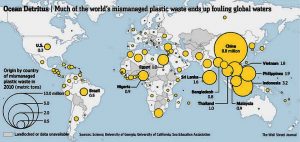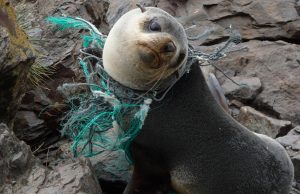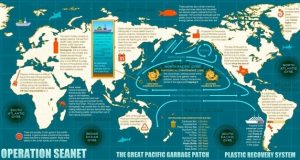Plastics – Stop Littering – We need to make a change !
by S. Oram (new blogger)
Where do you throw your plastics and trash when you are done with it? I would hope you say you RECYCLE ! Because just throwing that container away by mixing it with the normal trash or discarding out the window creates problems. Part of this problem is POLLUTION. This pollution creates visual aesthetic issues, but also damages habitat and threatens the land, air, and sea animals. Did you ever stop and think about how these things can affect the animals outside? Most plastic waste comes from third world countries especially in China, but we can still make a difference.
 https://goo.gl/images/38xfsv Online Source –
https://goo.gl/images/38xfsv Online Source –
In the 1970s, the National Academy of Sciences estimated about 45,000 tons of garbage and waste was being tossed and thrown in the ocean. Since initial estimate, it has gotten even worse. Many people throw things in the ocean and don’t think about the animals in it or the other uses downstream. The materials can get wrapped around the animals or some of the animals eat. The animals become hurt, sick, and die. Littering can kill marine life and destroy habits. Some people don’t stop to think about the animals and their safety. Over 100,000 marine mammals and 1 million sea birds are killed each year from plastic pollution and 6 million tons of debris, i.e., a ton is 200 lbs , enters the ocean each year. It is time to say – Enough!

Sad there is no reason to create this type of pain and suffering.
Did you know it can take up to 450 years for plastic bottles to decompose? This does not appear to be true. “Scientists Thought It Took Thousands of Years for Plastic to Decompose – It May Only Be Decades” and “A more recent study revealed that PET degrades more rapidly than previously thought in ocean water due to the presence of metal ions in the water. Fifty percent degradation was said to occur in 4.5 years and 100% degradation in 72 years.”
Where is most of this plastic? (Operation Seanet)
Here is a list of wastes that go in the ocean and how long it takes to decompose.
Foam cups and tin cans – up to 50 years.
Plastic bottles depending on type and environment could be up to 450 years (Source)
Fine fishing net up to 600 years (much longer for heavier nets).
Cigarette butts- 1 – 5 years.
Plastic bags- 10 – 20 years (Some putting this debris in a plastic bag is not good enough) . The bags breakdown and this it may take 100s of years for the content to decompose.
SO – Simply Bagging the Trash is Not a Solution and Putting the Plastic in a Landfill is the Wrong Choice. We must make every effort to recycle, reuse, and then put our young minds together and help to clean up our oceans, beaches, and landscapes and develop better solutions.
My call to action:
- Please think twice before littering and think twice before throwing stuff away, especially plastic bottles.
- Try Going Bottleless –We tried and we saved money.
- Pick up litter and Recycle – Participate in local clean up events.
- Try to kick the plastic habit.
- Check out Operation – Seanet
other Articles
PFAS Cycle – https://shop.knowyourh2o.com/blogs/news/pfas-and-forever-chemicals-a-new-man-made-cycle-the-pfas-cycle-that-must-be-broken
Plastics and the Environment – Debunking Myths and Responsible Practices
Wildlife and Lead Poisoning – Lead is not Just a Problem for Humans
Sources:
http://www.perseus-net.eu/site/content.php?locale=1&sel=517&artid=565
https://www.dpaw.wa.gov.au/management/marine/marine-parks-wa
http://www.bluebird-electric.net/oceanography/Ocean_Plastic_International_Rescue/Logistics_Recycling_Plastic_Ocean_Cleanup_Cargo_Operations.htm

